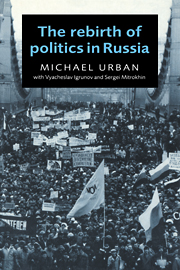Book contents
- Frontmatter
- Contents
- Preface
- Part I The pre-political context
- Part II Perestroika and the return of political life
- Part III Politics and revolution
- 7 The politics of opposition
- 8 The 1990 elections and the politics of national liberation
- 9 Parties in movement: the articulation of Russian political society at the close of the Soviet period
- 10 Restoration and revolution
- Part IV Ground up: politics in post-communist Russia
- Notes
- Index
8 - The 1990 elections and the politics of national liberation
Published online by Cambridge University Press: 22 October 2009
- Frontmatter
- Contents
- Preface
- Part I The pre-political context
- Part II Perestroika and the return of political life
- Part III Politics and revolution
- 7 The politics of opposition
- 8 The 1990 elections and the politics of national liberation
- 9 Parties in movement: the articulation of Russian political society at the close of the Soviet period
- 10 Restoration and revolution
- Part IV Ground up: politics in post-communist Russia
- Notes
- Index
Summary
The 1990 elections represented a critical phase in the disintegration of the communist order in Russia. Already, Gorbachev's project to renew the Communist Party – disentangling it from state administration, ending its petty administrative tutelage over every aspect of life and focusing its efforts on solving the country's ‘strategic’ problems which would earn for it the support of the citizenry – had been racking up results quite contrary to those intended. Members were deserting the CPSU in large numbers, either actively by turning in their party cards or passively by not turning in their party dues and otherwise lapsing inactive. Circulation of the party press plummeted, activists were transferring their skills and energies to its competitors, and open political warfare among contending factions broke out within it. By the time that these elections were called, the self-proclaimed vanguard was approaching total disarray. Opposition foci were springing up within, around and outside of the Communist Party. Now it would take another pounding at the polls.
Our concern in this chapter is to analyse political organization under the conditions of Russian national and local elections that commenced with the nomination of candidates in December 1989 and concluded with the balloting of 4 March 1990 and the various run offs and repeated elections that followed. These elections functioned like some great centrifuge, sorting political society into distinguishable layers, separating those forms and forces whose hour had arrived from those for whom it had passed. This centrifuge, of course, had first spun a year earlier, yielding more or less distinguishable opposition groupings to the left and right of Gorbachev.
- Type
- Chapter
- Information
- The Rebirth of Politics in Russia , pp. 172 - 200Publisher: Cambridge University PressPrint publication year: 1997



